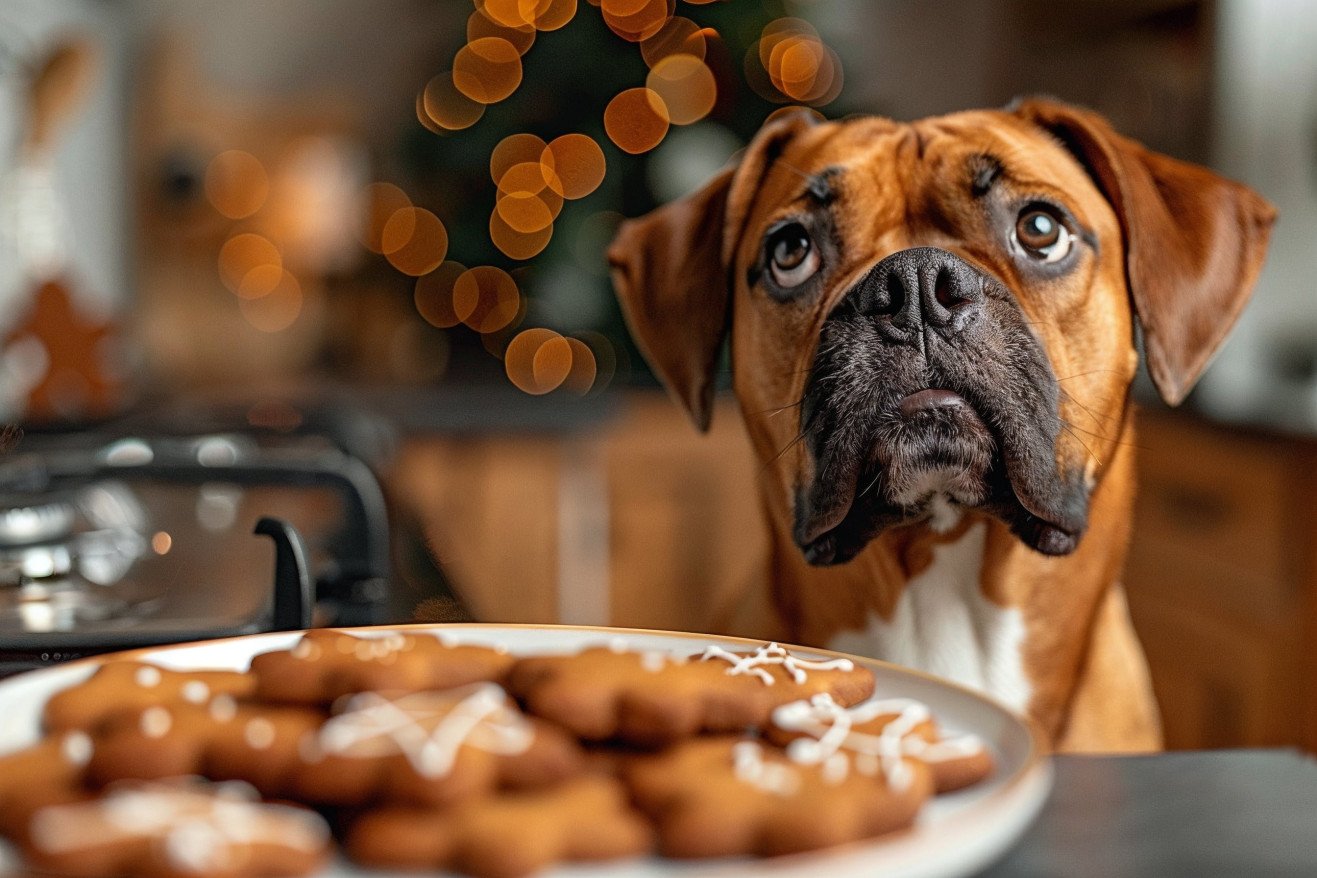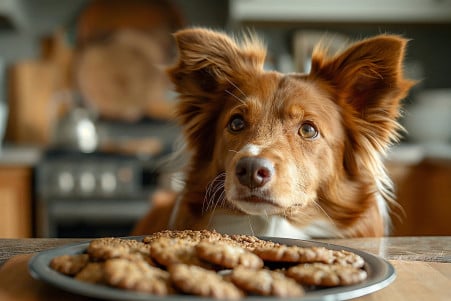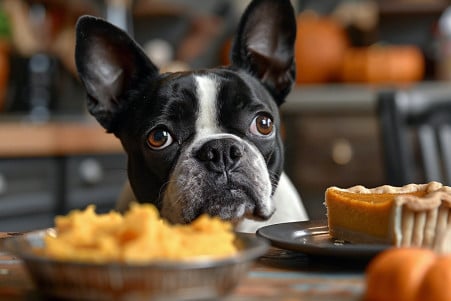Can Dogs Eat Gingerbread? Potential Dangers and Healthier Options
2 March 2024 • Updated 1 March 2024

Gingerbread, a classic holiday treat, makes pet parents wonder: can dogs enjoy this seasonal snack? Dogs cannot eat gingerbread. Not only is nutmeg, one of the ingredients in gingerbread, toxic to dogs, but the high sugar and fat content in gingerbread can also cause pancreatitis. As a result, it’s important to keep gingerbread away from your dog and offer healthier dog-friendly alternatives instead.
This in-depth investigation will draw on a range of reputable veterinary perspectives and nutritional research to explain why gingerbread and other holiday baked goods can be harmful to dogs.
It will explore the effects of the ingredients in gingerbread, the nutritional needs of dogs, and the health risks associated with dogs eating human food. With this information, you can make sure you’re protecting your dog from potential health issues during the holidays and throughout the rest of the year.
Can dogs eat gingerbread?
Nutmeg in Gingerbread Can Lead to Myristicin Toxicity in Dogs
Nutmmeg, which is often used to flavor gingerbread, contains a compound called myristicin, which is poisonous to dogs. According to the Pet Poison Helpline, the consumption of large amounts of nutmeg can result in myristicin toxicity in dogs, which can cause symptoms like hallucinations, disorientation, and even seizures that can last up to 48 hours.
Wag Walking explains that other symptoms of myristicin toxicity include dehydration, panting, ataxia, and tachycardia. The symptoms can range from mild gastrointestinal upset to more serious issues like hypertension and seizures. The amount of nutmeg needed to cause toxicity is quite small, with as little as one teaspoon of ground nutmeg potentially leading to toxicity.
Immediate veterinary treatment is necessary, and veterinarians will usually administer supportive care. The AERC explains that if a dog has consumed a toxic amount of nutmeg, a veterinarian may have to perform gastric lavage and then give the dog activated charcoal to absorb the toxins. Hospitalization for 24–48 hours is recommended for observation of the dog’s vitals and any potential seizures.
The fact that nutmeg is an ingredient in gingerbread makes it especially important to keep gingerbread away from dogs. The fact that nutmeg is so appealing to dogs makes it especially dangerous, and it’s a good example of why human foods that are flavored with spices, like gingerbread, aren’t safe for dogs.
The Good and Bad News About Dogs and Gingerbread
While the holiday season may make it tempting to share gingerbread and other sugary snacks with your dog, the impact on their health can be dire. MasterClass explains that sugar can lead to diabetes and heart disease in dogs.
Meanwhile, Trupanion warns that the high sugar content in gingerbread can cause metabolic changes, obesity, diabetes, and dental decay in dogs. The appeal of gingerbread to dogs can make them more susceptible to these chronic issues.
The dangers don’t stop there, though. The high-fat content in gingerbread can also be problematic for dogs. High-fat foods can lead to pancreatitis, which is a painful and potentially life-threatening condition in dogs. Symptoms of pancreatitis include vomiting, lethargy, abdominal pain, and diarrhea. Pettsie urges dog owners to make sure that their dogs are eating a balanced diet that’s low in sugar and free from high-fat ingredients to ensure that they’re healthy and happy.
While giving your dog a treat is a way to show them love, it’s important to make sure that this act of love doesn’t lead to health problems. Instead, make sure that you’re feeding your dog a balanced diet that helps them stay healthy and happy.
Always make sure that you’re paying attention to the ingredients in the treats you give them. That way, you can show them love and make sure that they’re staying healthy at the same time.
Nutritional Needs for Dogs
A well-rounded diet for dogs, as described by VCA Animal Hospitals, includes a number of different nutritional components such as proteins, fats, carbohydrates, minerals, and vitamins. Proteins provide essential amino acids, and fats provide energy and help with vitamin absorption. Carbohydrates offer quick energy, and fiber helps with digestion. In addition, PetMD notes that dogs need certain vitamins and minerals to help with body processes and prevent deficiencies.
Many of the dietary restrictions for dogs come from the potential dangers of certain human foods. For example, gingerbread contains nutmeg, which is toxic to dogs, and high amounts of sugar and fat can lead to health problems like diabetes and pancreatitis. This is also why human treats can be bad for dogs, as they aren’t made with the dog’s nutritional needs in mind.
To make sure you’re giving your dog the best treats and food, always look for products that meet the AAFCO standards, which list the essential nutrients needed for a balanced diet. Also, make sure that your dog’s diet is meeting the needs of all life stages, from puppy to senior, as recommended by VCA Animal Hospitals.
If you’re ever in doubt, ask your vet to help you choose treats that meet your dog’s specific nutritional requirements, ensuring that they stay healthy and happy.
Safe Holiday Treats for Dogs
With the holidays just around the corner, many pet parents may be wondering what special treats they can give their four-legged family members. The Wildest notes that carrots, cooked sweet potatoes, and plain apples are all healthy options for dogs that don’t come with the risks of traditional holiday treats like gingerbread.
For pet parents who like to cook, ASPCA Pet Health Insurance shares recipes for homemade treats, including Turkey and Cranberry Dog Bones, Sweet Potato Pumpkin Pet Treats, and Apple, Oat, and Peanut Butter Treats.
These treats are specifically designed for dogs so they meet their dietary needs and don’t include the harmful ingredients often found in human treats. PetMD suggests giving your dog frozen pumpkin puree cubes or homemade dog treats made with dog-safe spices like cinnamon instead of nutmeg. However, it’s best to stick with treats that don’t include spices, fats, and sugars that are commonly found in human holiday treats.
As always, it’s important to talk to your vet before introducing any new treats into your dog’s diet to make sure they’re safe and healthy for your dog. This will help ensure that your pet stays healthy and happy during the holidays and throughout the year.
Final Considerations: Gingerbread and Your Dog's Health
In summary, gingerbread is definitely not a good option for your dog. Nutmeg is toxic to dogs, and the high sugar and fat content in gingerbread can also be dangerous. It’s important for dog owners to know the signs of nutmeg poisoning, including disorientation and seizures, and to recognize the signs of gastrointestinal upset, which can be caused by high-fat and high-sugar foods, to avoid chronic conditions like diabetes and pancreatitis.
This look at the dangers of gingerbread serves as a reminder of some of the broader principles of dog nutrition. It’s important to make sure that dogs are getting a nutritionally complete, balanced diet that meets their specific needs and to make sure that they don’t eat foods that are toxic to them.
As we get into the holiday spirit, it’s important to make sure that our generosity doesn’t put our dogs’ health at risk. Setting an example of responsible pet ownership by making sure that we’re giving our dogs appropriate treats and seeking out expert advice when we’re not sure is something we can all do.
In doing so, we can enjoy the holiday season with the peace of mind that comes with knowing that our dogs are healthy, happy, and safe.


